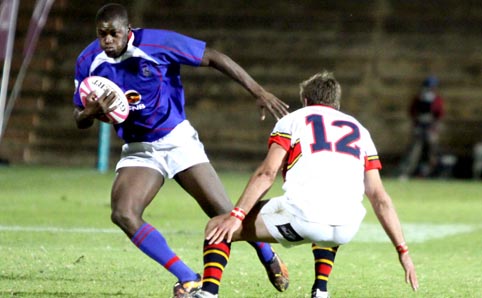 |
Jamba Olengu in action.
Photo: Van Zyl Naudè |
On Monday, 7 March 2011 Steinhoff International will be presenting the last Varsity Cup match for the season on Xerox Shimla Park, as the FNB Shimlas take on the NWU Pukke. Do not miss this mini intervarsity! The Shimlas need your support.
The match, which starts at 19:00, will be preceded by matches between the FNB UFS U.19 vs. the NWU u.19 (15:00), and the FNB UFS u.21 vs. the NWU u.21 (16:30). So, take your seat early and also watch as, for the first time during a Varsity Cup match in Bloemfontein, parachuters will land on Xerox Shimla Park. Look out for this sight between 18:30 and 19:00.
Let us arrive in our numbers and make it a record breaking crowd to support our FNB Shimlas. Big prizes are once again at stake. Carling Black Label is giving away two Apple iPods. Tickets will be sold at the gate and will put you in the draw for one of these incredible prizes.
Campus residences and associations who rocks up in the biggest numbers, is the most visible and who is making the loudest noise stand a chance to win a six month DSTV subscription.
Tickets will be sold for R10, fifty percent less than the normal price.
The normal price is R20 per ticket, but a limited number of tickets will be sold at R10 per ticket for students who do not have a royal blue supporter shirt on. These tickets are available from the south ticket office at Xerox Shimla Park. They will be sold on a “first come first served” basis. Once the tickets have been sold out, the normal price of R20 would apply once again. So be at the field early and save R10 on your ticket.